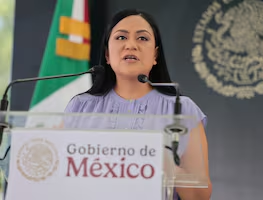Más Información

INE aprueba ampliación presupuestal de 9.2 mdp; se destinará para comprar chalecos en elecciones del Poder Judicial

Sheinbaum anuncia obras de infraestructura en Nayarit; destaca puente que irá de Bahía de Banderas a Puerto Vallarta y un acueducto

Detienen a presunto jefe de célula delictiva allegada a Los Chapitos; se encargaba de narcomenudeo y compra-venta de armamento

“¡Arráncate, Coalcomán!”; así fue la campaña de Anavel Ávila, presuntamente ligada al “Mencho”, para Movimiento Ciudadano

Presupuesto para programas sociales está asegurado en la Constitución: Ariadna Montiel; destaca que se benefician a 320 mil nayaritas

Sheinbaum anuncia construcción de Farmacias del Bienestar en 2025; asegura habrá medicamentos gratuitos para personas vulnerables
Anna Teixidor
(Figueres, 1978) has devoted herself to the study of jihadist radicalization . In her research on the subject, this specialized journalist spent two years chatting daily with a 22-year-old Spaniard who joined Al-Qaeda in Syria. In a telephone conversation, she explains to EL UNIVERSAL why young people without integration problems end up embracing terrorism.
"People immersed in these dynamics do not get tired," says Teixidor. "It's not like they talk about this for a while. I chatted six hours a day with them. And they kept sending messages all day long. It is very intense. The dynamic drags you."
Teixidor explains that the radicalized young people are immersed in a parallel reality . "It is difficult to understand how some people end up killing for an idea. There is an important component of unreality in the dynamic. When you talk to them, you realize that several of their referents are fictional characters who defend justice, "she says.
Still, is there a typical profile of individuals prone to radicalization? Can it be considered a consequence of marginalization and material deprivation? This certainty is cracked by the terrorists of Barcelona . They studied, worked and lived in a small municipality ( Ripoll ), not in degraded neighborhoods with a large Muslim concentration, such as neighborhoods located in Ceuta , Melilla and the industrial area of Barcelona, areas of greatest jihadist intensity in Spain .
"There is a consensus among experts that there is no typical profile of jihadists or common motivation for all of them," says Teixidor. "The socioeconomic factor is very often emphasized, but it is not the only one. In this case, the main factor was ideological .
The researcher does not deny that poor integration or frustration due to lack of opportunities “accelerate the process, but they are not essential." Ideology and the desire for adventure are key. There is a fundamental element present in Al-Qaeda manuals: recruiters make recruits think they are the chosen ones ," says Teixidor.
Teixidor believes that, even though there is a tendency to talk about radicalization on the Internet, the physical presence of an influential figure is the best guarantee for effective indoctrination. "Many experts are beginning to argue that the importance of social networks in these processes has been overestimated," she concludes.
Anna Teixidor
is an expert in radicalization process.
sg




